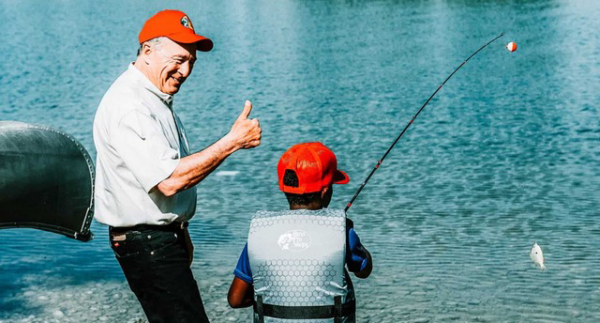Johnny Morris Donates Yet Again to Conservation
— Frank Sargeant
Frankmako1@gmail.com
Johnny Morris is a classic American success story, starting out in his 20’s selling a little tackle out of his father’s liquor store in Springfield. Missouri in 1972.

Today, the company he built, based mostly on the Bass Pro Shops logo, has a value of about $6.5 billion and employs over 40,000.
It owns not only 152 Bass Pro Shops superstores nationwide and in Canada but also 50 Cabela’s stores as well as White River Marine Group, parent company of Tracker, Ranger, Triton, Mako and other well-known boating brands sold at hundreds of dealerships around the nation.
And Morris has done an amazing amount of good with the money he and his team have earned. Just this month, as reported in yesterday’s TOW, he donated an added $1.5 million generated by the Bass Pro Shops World’s Fishing Fair and Concert in Springfield, Missouri
As with a number of other high-profile outdoors companies these days, the Bass Pro Shops empire has done its best to support the fish, wildlife and the outdoors fans that have made success possible. It all comes back to Johnny Morris, who has made a lifelong commitment to conservation.
The company has an ongoing effort to seek out and support worthwhile causes—see details here: https://about.basspro.com/community/support.
(In full disclosure, I worked for Outdoor World Television, a part of Bass Pro Shops, for eight years in the early 2000’s.)
More fishing news below…
Florida’s Big “O” Gets Cleanup Effort
Florida’s Lake Okeechobee is a magnet for bass anglers from all over the nation, but its productivity has suffered in recent years due to excessive nutrient and poor water quality, mostly from the Kissimmee River which carries the outfalls of millions of humans and tens of thousands of cows southward to the big lake.
Now, the state’s Fish and Wildlife Commission is trying something different at the lake, where thousands of acres are currently covered with floating vegetation so that boats can’t get through it. The massive rafts of hyacinths and other invasive plants are not nearly as productive as natural shorelines and marsh areas where native rooted water plants grow.
The state is paying to have the floating weeds harvested, converted to a liquid slurry, and sprayed on agricultural lands away from the lake as fertilizer. The pilot project is cleaning about 35 acres.
The idea is to open more water so that rooted water plants can take hold, get rid of tons of nutrient, and ultimately improve the water quality and the fishery.
While this is a very expensive way to get rid of the problem, it does show immediate results.
I’ve seen it work on Bishop’s Harbor, a saltwater bay south of Tampa where a spill from a fertilizer plant caused explosive weed growth in the 1980’s. (The same area had a more recent spill, again with unfortunate results.)
Basically the weed harvesters are floating combines, paddle-wheel-powered boats with conveyers on the front end that scoop up the floating weeds and deposit them in a bin onboard for transfer to trucks ashore. The advantage over spraying is that the nutrient in the plants does not wind up as nutrient-loaded muck on the bottom—it gets taken out of the water, resulting in a cleaner eco-system.
The FWC says the program will be expanded if it proves beneficial, and will be combined with their continued spraying programs as well as water level variations to try to make the lake more productive and navigable—a good effort on Florida’s most important bass fishery. See more about it here: https://myfwc.com/wildlifehabitats/habitat/invasive-plants/aquatic-plant.
Gag Grouper Restrictions Likely in Gulf
Federal fishery managers report that gag grouper is overfished and experiencing overfishing in the Gulf of Mexico, and that’s bad news for a lot of reef anglers.
The most recent stock assessment indicated the proportion of males in the gag grouper population is less than 2%, which negatively impacts the stock’s ability to reproduce. Grouper are one of the species where a number of females become males as they reach full maturity, and if too many are harvested while young, there’s a dearth of males in the population.
The Council says it is “obligated to end overfishing and develop a rebuilding plan for gag grouper, which will dramatically reduce catch limits during the rebuilding period.”
Since gags are a primary target in the eastern Gulf, this will mean a major hit on recreational anglers and charter and party boats as well as the tackle shops, marinas and motels that service the industry.
The plan likely won’t be in place until 2024, so the Council asked NMFS to provide analyses for an interim rule to reduce harvest and end overfishing beginning January 1, 2023.
The analysis will include options for the equitable distribution of commercial and recreational quota based on an annual catch limit of 660,000 pounds, which corresponds to the longest rebuilding timeline, per Gulf Council.
The Council also recommended maximizing the number of recreational fishing days, which is anticipated to occur with a later start to the recreational fishing season.
The Council expects to continue work on this interim rule during its June 2022 Council meeting and finalize the request to NMFS on the proposed management measures for the January 1, 2023 fishing year at this meeting.
Unfortunately, more and more anglers exerting more and more fishing pressure means each of us gets less if our fisheries are to survive, here as elsewhere.






